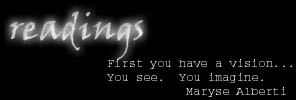
|
||
|
Editing (Lighting) (Cinematography) If you know very little about editing, and want to learn, or need to review the basics, read the Millerson - Editing packet on reserve in the library. Then watch some of the short videos in the Media Center, such as those in the Lessons in Visual Language series (TR850. L38), or Complete Guide to Video-Editing (TR899.C6 1988). Fairly short, fairly basic, a little old-fashioned but clear on the language and goals of editing. On alternate Fridays, between 12 and 2-00pm STAR offers free classes on analog video editing. Classes in digital editing (again free) are marked on the Star Schedule I sent round, if you want to try some hands-on practice. More experienced editors (or those who want to learn more) should read Edward Dmytryk's book On Film Editing (on reserve). In 143 pages, Dmytryk covers all the key aspects of cutting visual images together. Although the technology of cutting is now very different to that he describes, the principles of cutting (the action cut, the overlap, cutting of dialogue (very important for this project), reaction cutting, etc.) are all fresh and relevant today. His advice ranges from the global to the precise (leave four or five frames…), and is immediately and practically useful to any project. Digital editing has all the flexibility and room for experiment that the film editing Dmytryk describes has, and thus makes his book even more significant now. Film Editors on Film Editing (Vincent Lo Brutto) offers useful industry insights into the real problems editors face in the cutting-room.
Editing (Lighting) (Cinematography) If you want to learn about lighting (essential for directors, videographers), or want to understand the basics, read the Millerson - Lighting packet (on reserve in the library), and then look at the some of the basic short videos in the media center, such as Introduction to Television Lighting (TR 891.F4) and Feature Film Lighting (TR 891.I68) Those more experienced with lighting, or who want to learn more, should read the section beginning with The Logic of Lighting, p. 111 in Kris Malkewicz's book on Cinematography (finishes on p. 126) (on reserve as Lighting). Follow that with a serious study of the analyses of different lighting styles in John Alton, Painting with Light (Chapter 3 onwards), which offer technical and creative advice. (on reserve).
Editing (Lighting) (Cinematography) If you need to review the basics of cinematography and directing, or want to learn about directing the camera, read the Millerson - Camera I and Camera II packets on reserve in the library. Then look at some of the shorter videos in the media center, such as Shooting for Drama (TR 899.M36) Watch Visions of Light (on reserve), and read Larry Salvato's interviews with leading cinematographers in Masters of Light (on reserve). Tho' more about cinematography than directing, both offer valuable examples of shot composition, sequence composition, rhythm and pacing. Robert Rodriquez' Rebel Without a Crew chronicles the making of his movie Mariachi ( on reserve) on a seriously low budget. An entertaining and practical book about low-budget film-making, and essential reading for those who want to finance and make their own movies.
|
||